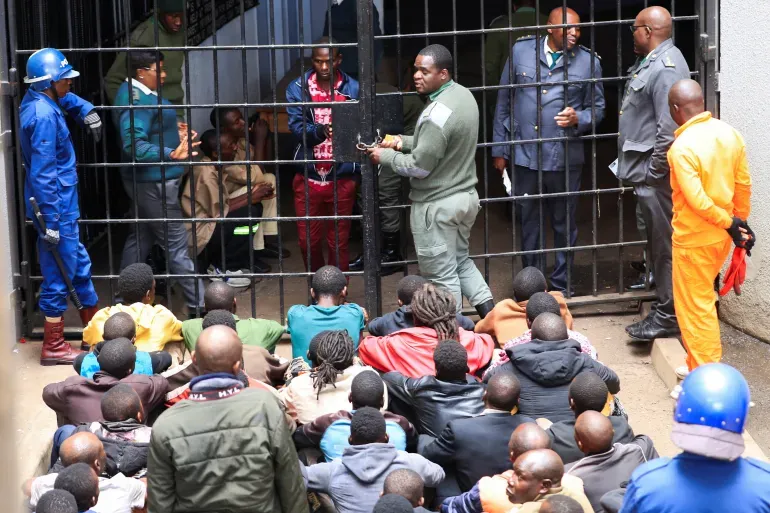In Summary
- Four masked men attempted to break into the offices of the Crisis in Zimbabwe Coalition (CiZC), a pro-democracy group, on August 7, likely government operatives, according to the organization.
- The incident is part of a broader crackdown on activists and opposition members in Zimbabwe as the country prepares to host the Southern African Development Community (SADC) summit.
- The Zimbabwean government has been accused of stifling dissent through arrests, intimidation, and violence, with over 160 people arrested since June.
Harare, Zimbabwe – On the morning of August 7, four masked men attempted to force their way into the offices of the Crisis in Zimbabwe Coalition (CiZC), a network of groups advocating for democratic freedoms in Zimbabwe. The break-in, which took place in Harare, is believed to have been carried out by government operatives, according to CiZC chairperson Peter Mutasa.
Inside the building, three staff members quickly hid as the intruders smashed a security camera outside the gate and tried to gain entry. The men left only after triggering an alarm, and it was only then that the terrified staff members emerged from hiding. Since the incident, the CiZC office has remained deserted, with staff too traumatized to return.
“No one wants to go there. It was a very traumatic experience for them, and they feel unsafe,” Mutasa told Al Jazeera. He suggested that the attack was likely linked to accusations made against him by a government-owned newspaper, which claimed he was planning demonstrations.
The break-in is the latest in a series of aggressive actions by Zimbabwean authorities against pro-democracy activists and opposition members as the country gears up for the Southern African Development Community (SADC) summit on August 12. The summit, which will be hosted in Harare, is the first time in a decade that the 16-member bloc has convened in Zimbabwe. President Emmerson Mnangagwa is also set to assume the leadership of SADC, marking a significant moment for his administration.
However, this anticipated moment of prestige is overshadowed by what activists describe as the government’s “paranoia” and increasing repression. In the weeks leading up to the summit, Zimbabwean police have flooded the streets, and security officials have targeted activists and opposition party members with accusations of attempting to disrupt the event. Since June, over 160 people have been arrested, with Amnesty International reporting that detainees have been subjected to physical assaults and psychological torture.
Among those arrested is Jameson Timba, leader of the opposition Citizens Coalition for Change (CCC), who was detained along with 77 others at a political gathering in June. Additional arrests followed on June 27 when protesters outside a Harare court demanded the release of the detained CCC members.
Mutasa believes the government’s actions reveal a deeper fear. “The government is paranoid. It’s afraid of its own people,” he said. “If it’s a government that was elected by people, that is confident of its legitimacy, we wouldn’t be experiencing what we are witnessing now.”
The government, however, has its own narrative. Home Affairs Minister Kazembe Kazembe accused opposition groups of trying to “inflict reputational damage” on the country and stated that measures had been put in place to prevent any disturbances during the summit.
The rise in repression has sparked concern among international observers. Mnangagwa’s administration, which came to power in 2017 after a bloodless coup ousted longtime leader Robert Mugabe, has increasingly been seen as continuing the same authoritarian policies. Despite promises of political reforms, the government has faced criticism for its handling of dissent, particularly in the lead-up to the upcoming elections in August 2023.
Earlier this year, the United States imposed sanctions on Mnangagwa, his wife, and several others for human rights abuses and corruption. In addition, the controversial Patriotic Bill, passed just before the elections, criminalized acts deemed as “wilfully damaging the sovereignty and national interest of Zimbabwe,” leading to further concerns about the suppression of political opposition.
As the SADC summit approaches, the silence of the regional bloc has been notable. Despite mounting calls from human rights organizations like Amnesty International and Human Rights Watch, SADC has refrained from condemning the Zimbabwean government’s actions. Some critics have even called for the summit to be moved out of Zimbabwe.
South Africa, a key SADC member and Zimbabwe’s neighbor, has also faced criticism for its lack of response. South Africa’s ruling African National Congress (ANC) has been accused of turning a blind eye to Zimbabwe’s human rights violations, despite its vocal stance on other international issues.
“South Africa’s silence … appears paradoxical,” said Tinashe Sithole, a political science lecturer at the University of Johannesburg. He suggested that Pretoria might be avoiding a confrontation with Harare to protect trade and security relations.
As the SADC delegates begin to arrive in Harare, the staff of CiZC and other activists fear that the situation will only worsen after the summit. With the ruling ZANU-PF party reportedly splintering into factions, some anticipate further crackdowns as Mnangagwa’s administration seeks to maintain control.
“We are working with the worst-case scenario,” Mutasa said. “We are now in the ZANU-PF succession mode, and we can’t rule out an escalation.”
https://www.africanexponent.com/zimbabwes-crackdown-on-pro-democracy-activists-intensifies-ahead-of-key-sadc-summit/


